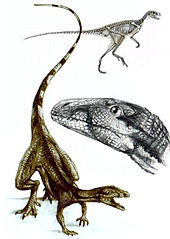Lagosuchus: Difference between revisions
Removed pointless authority. |
No edit summary |
||
| Line 28: | Line 28: | ||
{{Portal|Paleontology}} |
{{Portal|Paleontology}} |
||
{{Ornithodira|D.}} |
|||
{{Taxonbar|from=Q132937}} |
{{Taxonbar|from=Q132937}} |
||
Revision as of 00:29, 24 June 2018
| Lagosuchus Temporal range: Middle Triassic,
| |
|---|---|

| |
| Mounted skeleton | |
| Scientific classification | |
| Domain: | Eukaryota |
| Kingdom: | Animalia |
| Phylum: | Chordata |
| Clade: | Dinosauromorpha |
| Order: | †Lagosuchia Bonaparte, 1975 |
| Family: | †Lagosuchidae |
| Genus: | †Lagosuchus Romer, 1971 |
| Type species | |
| Lagosuchus talampayensis | |
Lagosuchus is a genus of small archosaur from the middle Triassic period. It is generally thought to be closely related to dinosaurs, as a member of the Dinosauromorpha. Its fossils were found in the Chañares Formation of Argentina, dating to the Middle Triassic (Ladinian age), about 230 million years ago.
Description

Lagosuchus is known from very incomplete remains (only a hind leg plus a shoulder blade and vertebrae can be definitely assigned to it). However, features of the leg show that it was a lightly built archosaur, and is notable for its long slender legs and well-developed feet - features it shares with certain dinosaurs. These features, as well as comparisons to close relatives, suggest that it could run on its hind legs for short periods, although it probably moved on all fours most of the time. Lagosuchus was likely an agile predator that could use speed to chase its prey and to escape larger predators.[1] Lagosuchus was about the size of a ferret.[2]
Lagosuchus is regarded by some to be dubious and the second species assigned to the genus, L. lilloensis, was reclassified as Marasuchus by Paul Sereno in 1994.
Palaeobiology
Metabolism
It is believed that Lagosuchus and Marasuchus were transitional between cold blooded reptiles and warm blooded dinosaurs.[3]
References
- ^ Palmer, D., ed. (1999). The Marshall Illustrated Encyclopedia of Dinosaurs and Prehistoric Animals. London: Marshall Editions. p. 97. ISBN 1-84028-152-9.
- ^ Paul, Gregory (1988). Predatory dinosaurs of the world. Simon & Schuster.
- ^ Pontzer, Herman; Allen, Vivian; Hutchinson, John R. (2009). "Biomechanics of Running Indicates Endothermy in Bipedal Dinosaurs". PLoS ONE. 4 (12). doi:10.1371/journal.pone.0007783. PMC 2772121. PMID 19911059.
{{cite journal}}: CS1 maint: unflagged free DOI (link)



